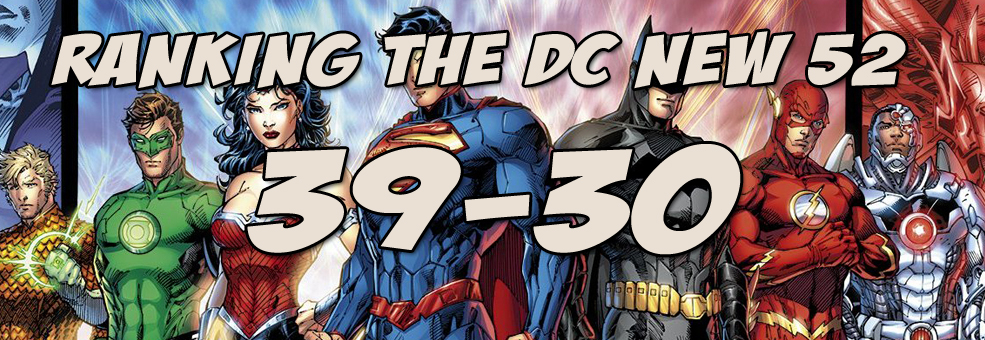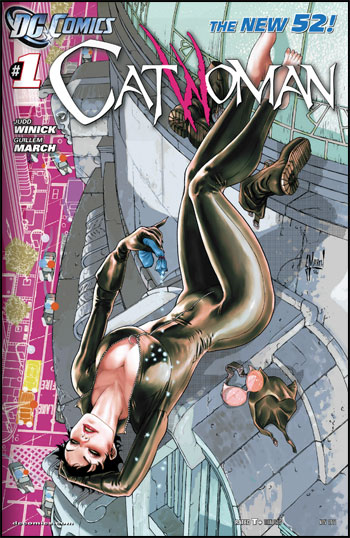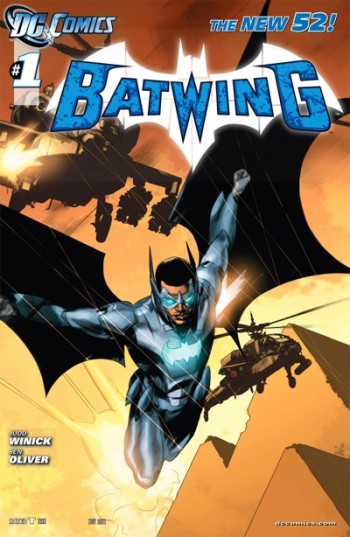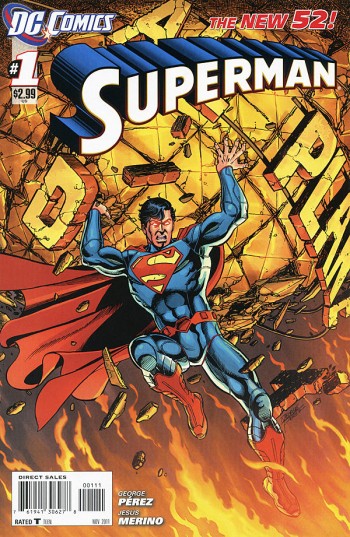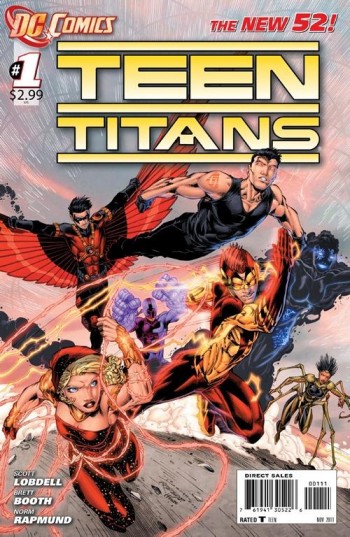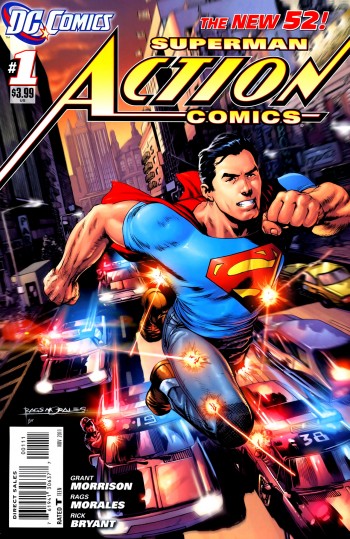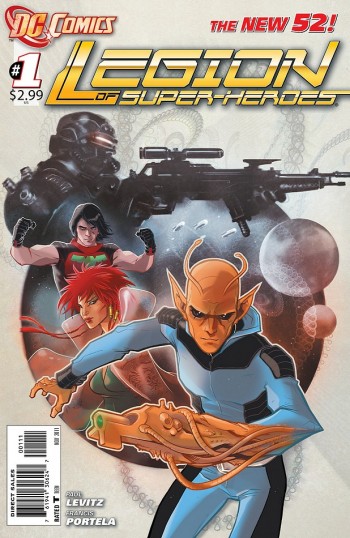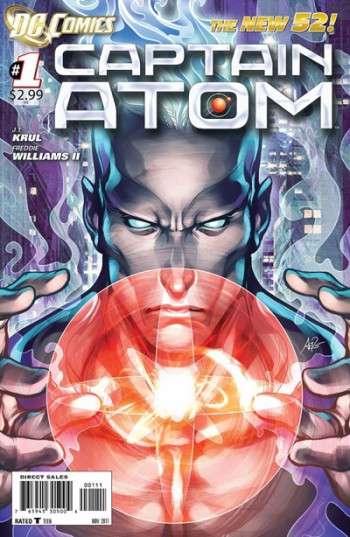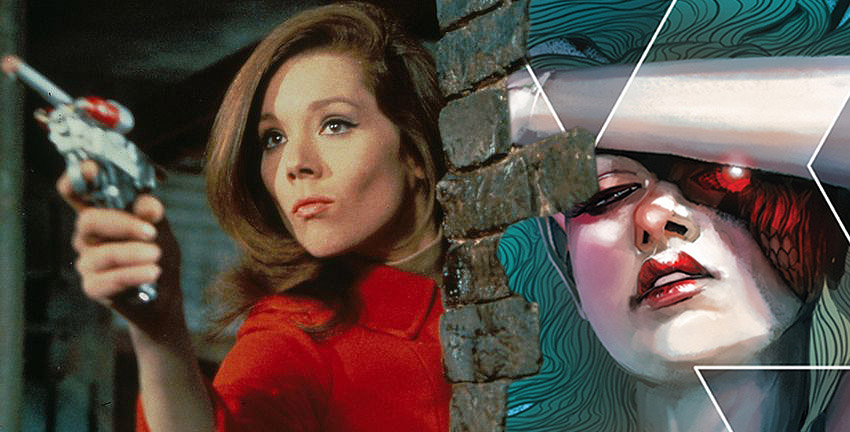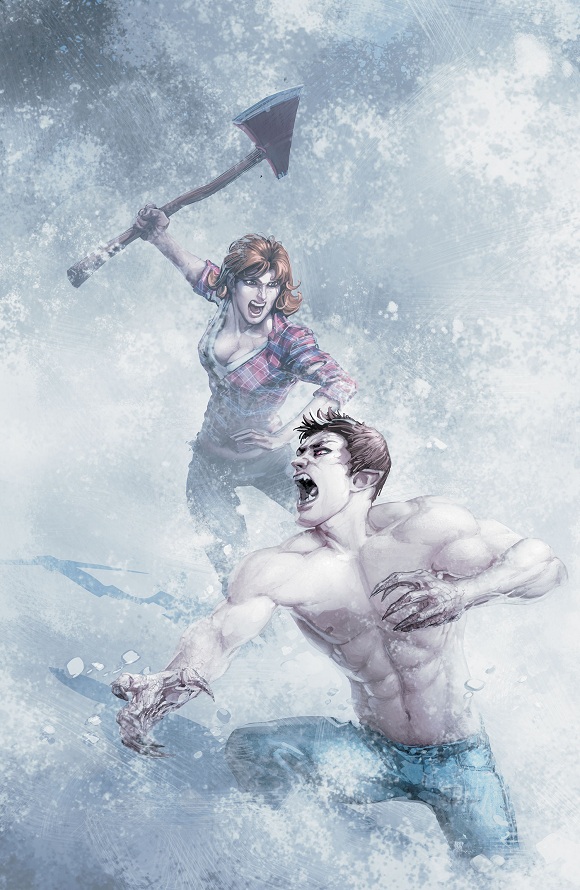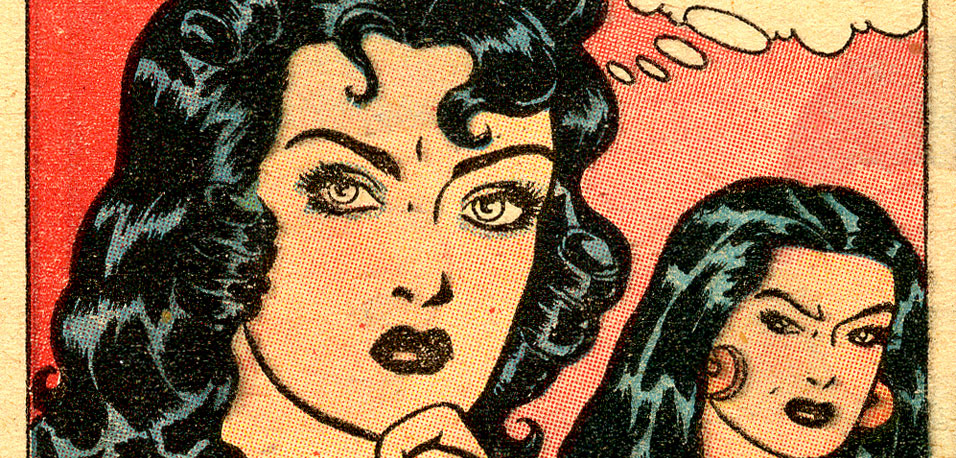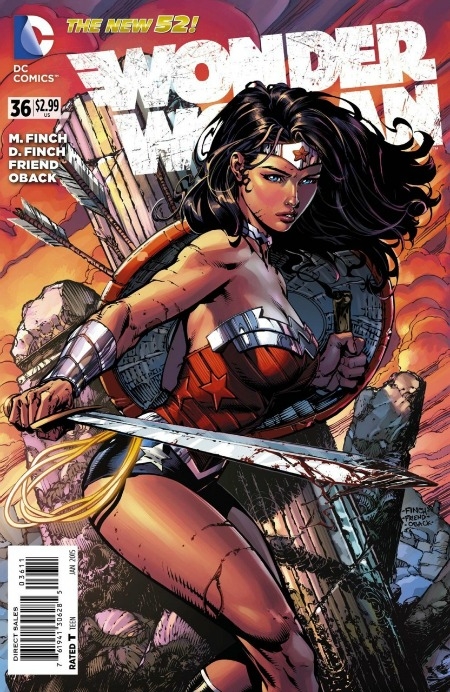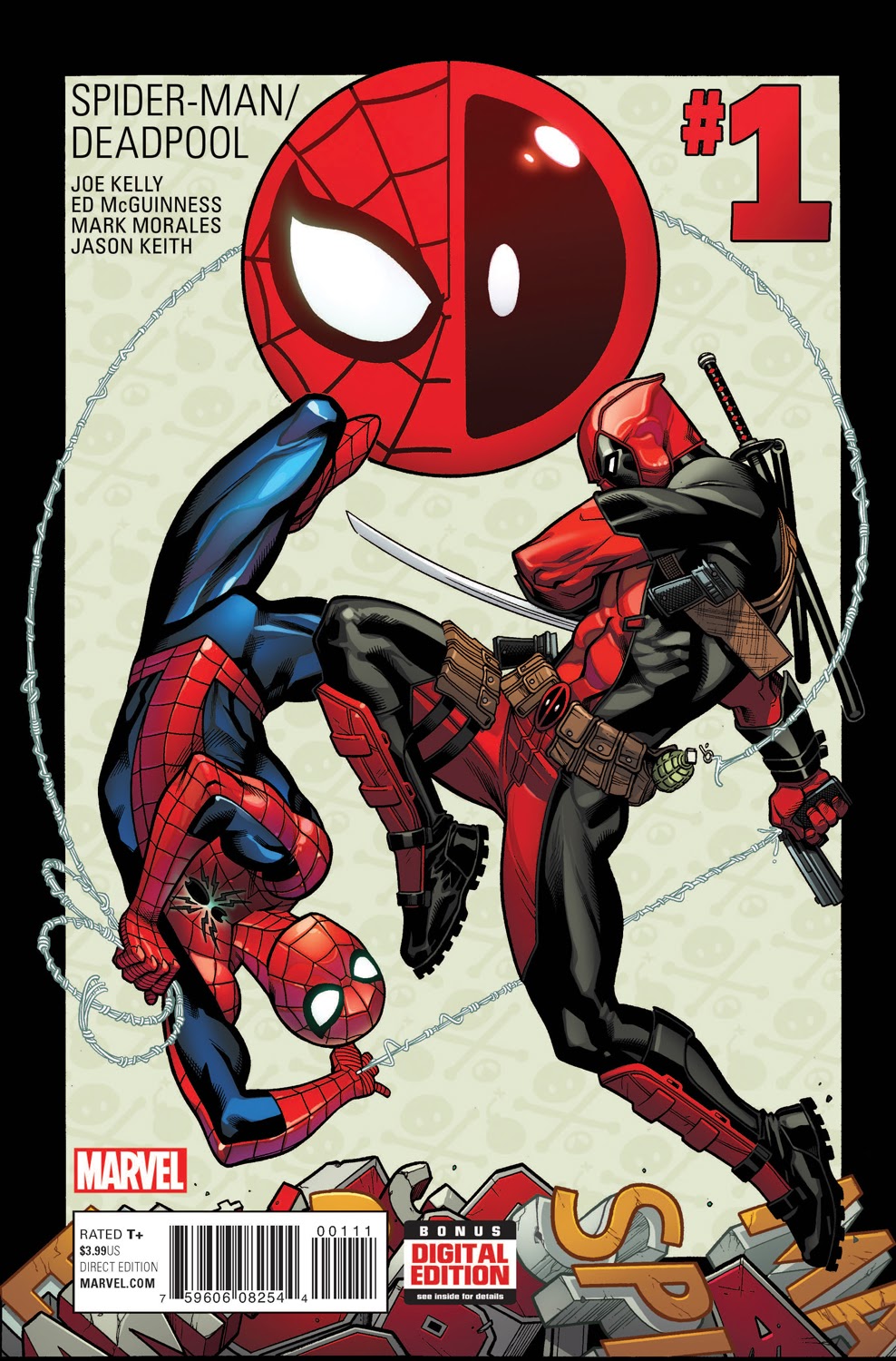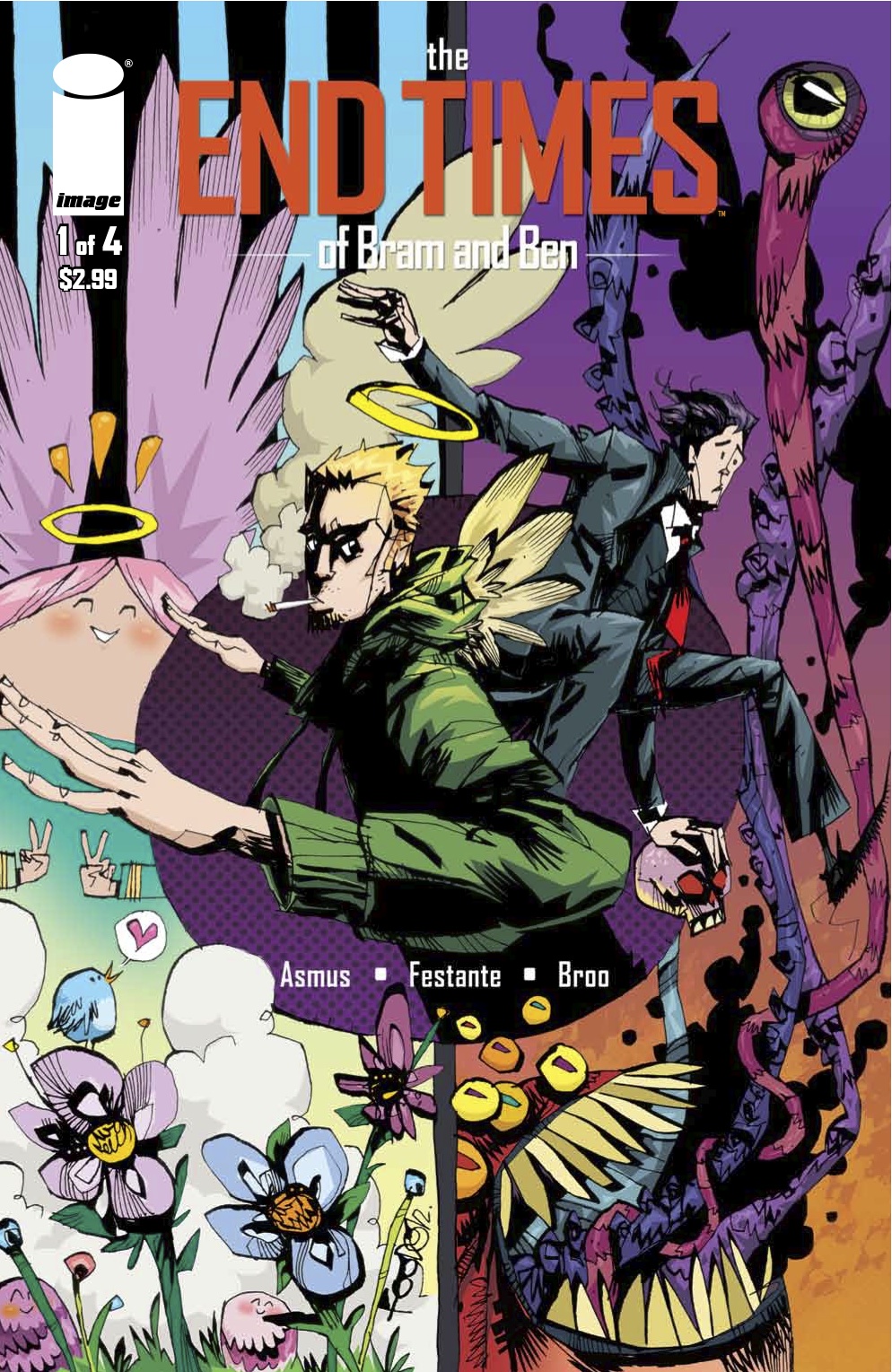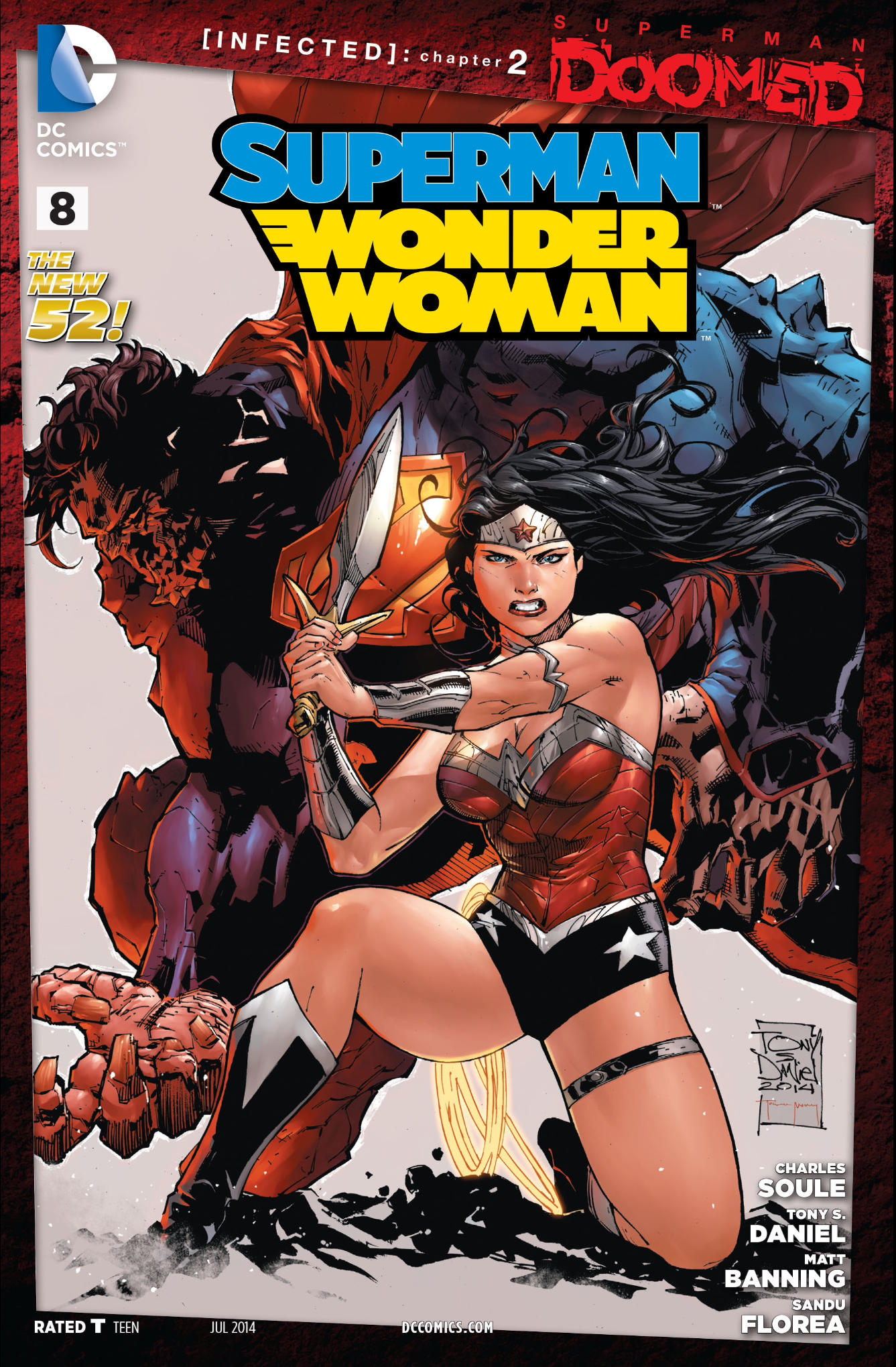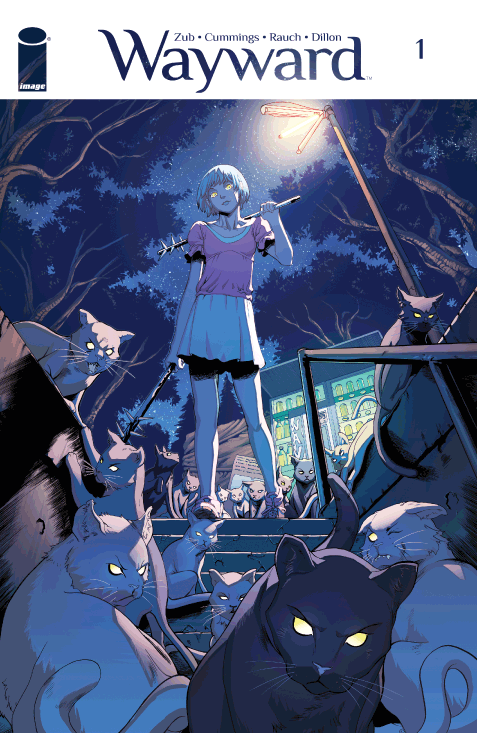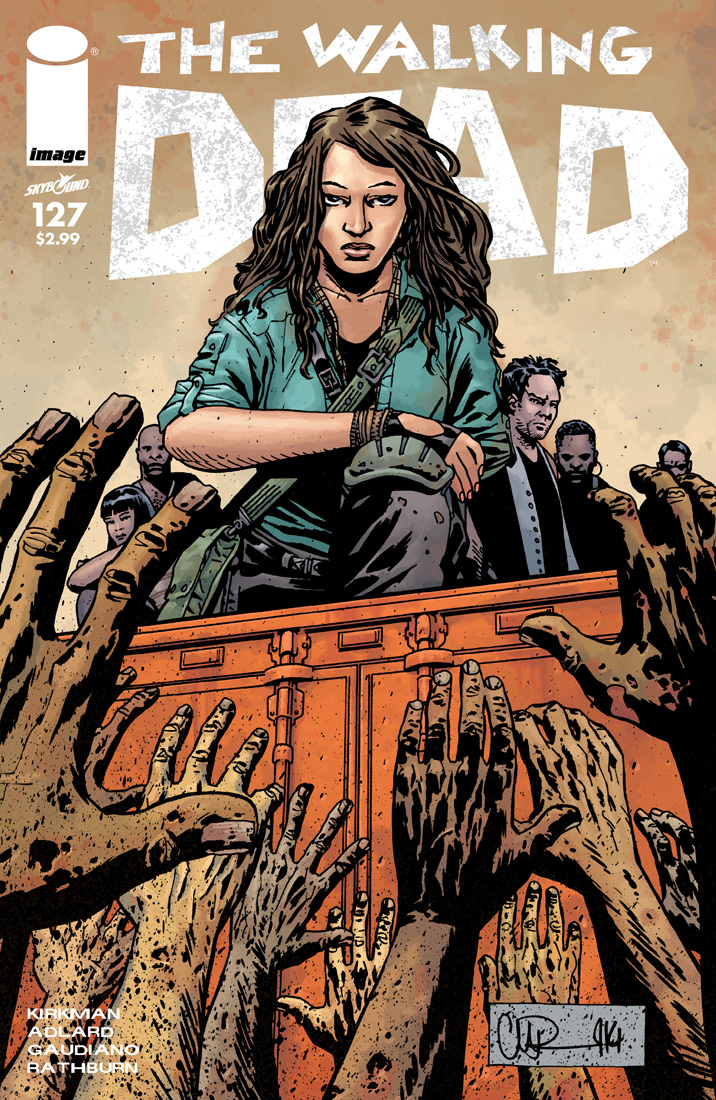By Bobby Shortle
Welcome to my ranking of the DC Comics New 52! I have spent the better part of the last month reading and re-reading all of the comics that debuted in this industry changing relaunch, and now over the next week or so I will be ranking them 52-1.
A couple of caveats, I have not read all twelve, or for some thirteen, issues of these series. Instead, I read as much as I could, until picking up the next issue seemed like the last thing I would ever want to do. For some that came at #3, for others #6 and for some it never came. If a book went under a creative change, I would always read at least one issue from that new creator in case things dramatically changed. I’m confident this allowed me to get a clear picture of the quality of the current runs and also helped me rank based on my gut feeling, rather than cold hard logic.
To give context to the article I have included excerpts from Talking Comics’ original reviews of these books and also sales numbers for the series in question.
If you missed it here is the link to the list featuring 52-40!
I welcome your reactions, disagreements and feedback which I hope you will leave in the comment section below. So, without further delay here is the Talking Comics DC New 52 Rankings:
Part 1: 39-30
39. O.M.A.C.
The Verdict Then:
“O.M.A.C. is a book aimed squarely at 8 eight year old boys. The book’s biggest strength and its biggest weakness is how downright silly it is. DiDio shoots for, and for the most part hits, a Stan Lee and Jack Kirby atmosphere that is at its best a downright blast. Unfortunately the book offers little in the way of substance. I don’t need this to be The Dark Knight Returns but when I decide to invest my time in a monthly story I would like to feel it will be worth my while.”
The Verdict Now:
My first impression of O.M.A.C. was pretty much spot on, in that it was a book that at times hit a supreme level of silliness, but never became an engrossing read to return to. The second issue is a great piece of contained, almost Incredible Hulk like, comic book storytelling, but the proceeding issues could not keep up its level of quality. O.M.A.C. had the right idea, be a silly, over the top and retro style comic book for all ages, but that caliber of the craft never matched with the premise.
Sales:
09/2011: O.M.A.C. #1 — 37,312
10/2011: O.M.A.C. #2 — 32,704 (-12.4%)
11/2011: O.M.A.C. #3 — 25,080 (-23.3%)
12/2011: O.M.A.C. #4 — 18,371 (-26.8%)
01/2012: O.M.A.C. #5 — 16,242 (-11.6%)
02/2012: O.M.A.C. #6 — 14,051 (-13.5%)
03/2012: O.M.A.C. #7 — 13,119 (- 6.6%)
04/2012: O.M.A.C. #8 — 12,587 (- 4.1%)
Cancelled
38. Catwoman
The Verdict Then:
From Steve Seigh’s review of Catwoman #1
“The feline femme fatale gets dirty in this first exciting issue with plenty of espionage, harrowing escapes, and oh-so-sexy wardrobe changes that will make your ears grow red and your pants too tight. Filled with plenty of blood, violence and action the panels seem to merge together forming some pretty impressive sequences inside your mind’s eye.”
The Verdict Now:
If you have listened to the Talking Comics Podcast you have heard the team complain continuously about the oversexualization of Selina Kyle. I have no issue with Catwoman being sexy, but Judd Winick’s writing and Guillem March’s art have transformed the character from self possessed and powerful woman into a tart.
The only reason that this series isn’t even lower on the list, is that the first arc does have moments that transcend the series’ focus on boobs, buns and Batman sex to find some emotional truths. Selina’s handling of the death of someone very close to her provides a depth to the character that should be the rule and not the exception. Ann Nocenti takes over duties on the book with issue 0, and here is to hoping that Catwoman can get back on track.
Sales:
09/2011: Catwoman #1 — 59,633
10/2011: Catwoman #2 — 63,573 (+ 6.6%)
11/2011: Catwoman #3 — 52,196 (-17.9%)
12/2011: Catwoman #4 — 45,581 (-12.7%)
01/2012: Catwoman #5 — 44,034 (- 3.4%)
02/2012: Catwoman #6 — 41,447 (- 5.9%)
03/2012: Catwoman #7 — 39,608 (- 4.4%)
04/2012: Catwoman #8 — 38,711 (- 2.3%)
05/2012: Catwoman #9 — 49,726 (+28.5%)
06/2012: Catwoman #10 — 37,158 (-25.3%)
07/2012: Catwoman #11 — 35,551 (- 4.3%)
37. Batwing
The Verdict Then:
From Brad Jones’ Review of Batwing #1
“It’s Batman meets “Blood Diamond” with a twist of “Dexter.” Batwing #1…Besides genuinely enjoying this introductory issue, I loved the watercolor-like art style of the book. The art direction of the book lends itself beautifully to both the landscape of Africa and also the intense violence the book presents.”
The Verdict Now:
Batwing is a tough book to place because I can’t actually say there is a full issue of the book that I thoroughly enjoyed and yet I look back on it with kinder eyes than a books like O.M.A.C. or Judd Winick’s other title Catwoman. I think this is because if nothing else, Batwing is trying to mine unfamiliar territory by creating a complex hero and environment with which to tell its story. Unfortunately, the tale of the african Batman is mostly a failure.
I like the checkered past of our hero David and the constant theme of your past catching up to you, but the execution is heavy handed, drawn out and is weighed down by characters who say every single thing they are feeling. I will agree with Mr. Jones though on one point, the art by Ben Oliver is gorgeous and is perfectly suited to the vast african landscapes. It’s a mediocre book that lacks execution and excitement and one that doesn’t deserve your dollars.
Sales:
09/2011: Batwing #1 — 45,980
10/2011: Batwing #2 — 42,750 (- 7.0%)
11/2011: Batwing #3 — 35,110 (-17.9%)
12/2011: Batwing #4 — 26,726 (-23.9%)
01/2012: Batwing #5 — 24,036 (-10.1%)
02/2012: Batwing #6 — 21,643 (-10.0%)
03/2012: Batwing #7 — 21,058 (- 2.7%)
04/2012: Batwing #8 — 20,373 (- 3.3%)
05/2012: Batwing #9 — 35,731 (+75.4%)
06/2012: Batwing #10 — 20,724 (-42.0%)
07/2012: Batwing #11 — 20,047 (- 3.3%)
36. Superboy
The Verdict Then:
“More THX 1138 than Boy of Steel; Superboy #1 is an engaging science fiction morality tale dressed in a super hero skin”
The Verdict Now:
Superboy stands as one of my biggest disappointments of the DC New 52, albeit one that has one very strong element. I love Connor Kent’s internal voice, the way he meters out his developing morality and deals with being a clone. Unfortunately, I disliked the sluggishly paced, overwrought plot more than I liked the internal monologue of our hero. The truth is, it took too many issues for Superboy to get where he was going, and when he got there, it wasn’t anywhere I wanted to be.
Sales:
09/2011: Superboy #1 — 55,608 (+173.7%)
10/2011: Superboy #2 — 57,424 (+ 3.3%)
11/2011: Superboy #3 — 47,442 (- 17.4%)
12/2011: Superboy #4 — 40,002 (- 15.7%)
01/2012: Superboy #5 — 37,419 (- 6.5%)
02/2012: Superboy #6 — 34,520 (- 7.8%)
03/2012: Superboy #7 — 33,050 (- 4.3%)
04/2012: Superboy #8 — 31,900 (- 3.5%)
05/2012: Superboy #9 — 34,838 (+ 9.2%)
06/2012: Superboy #10 — 31,358 (- 10.0%)
07/2012: Superboy #11 — 29,677 (- 5.4%)
35. Superman
The Verdict Then:
From Brad Jones’ Review of Superman #1
“This universe feels parallel to all that I know of Clark Kent/Superman, while relying on my knowledge of the past to move forward. I’m not sure how comfortable I am with the manipulation, as nothing I’ve seen so far has particularly moved me in any positive direction.”
The Verdict Now:
Not a good showing for the male side of the Super-Family as I found Superman only slightly more engaging than his “Boy” counterpart. The entire run of this book, which spans two creative teams, has reduced Supes down to his most stereotypical behavior. He punches a bunch of big things, very hard, and hopes that is good enough. Nothing pops about the character, not when he is flying around Metropolis, or when he is breaking stories as Clark Kent. The other human characters fare much better as I found the stories of Lois, Perry and Jimmy to be much more engaging than anything with the Man of Tomorrow. Superman feels chained down by its lack of originality and its need to play off of the yet to be finished origin of the character over in Action Comics. Much like Detective Comics, it’s a shame to see such a flagship franchise stuck in the mud.
Sales:
09/2011: Superman #1 — 131,529 (+266.2%)
10/2011: Superman #2 — 104,703 (- 20.4%)
11/2011: Superman #3 — 86,386 (- 17.5%)
12/2011: Superman #4 — 76,532 (- 11.4%)
01/2012: Superman #5 — 73,719 (- 3.7%)
02/2012: Superman #6 — 69,633 (- 5.5%)
03/2012: Superman #7 — 66,588 (- 4.4%)
04/2012: Superman #8 — 64,486 (- 3.2%)
05/2012: Superman #9 — 62,232 (- 3.5%)
06/2012: Superman #10 — 59,081 (- 5.1%)
07/2012: Superman #11 — 56,066 (- 5.1%)
34. Teen Titans
The Verdict Then:
From Brad Jones’ review of Teen Titans #1
“This is a fresh style for a fresh team of heroes, and after the barrage of superhero groups we’ve already seen from the New 52, Teen Titans individualizes itself from the dredge of Legion of Superheroes, Legion Lost, etc. There’s dimension to this book, both in style and substance, and I, for one, am mucho excited to see what and who comes next.”
The Verdict Now:
Teen Titans is the equivalent of a subpar, but addictive television show. If you watch it episode by episode on TV you will get annoyed and frustrated by the inconsistent characters and slow moving plot, but if you take in the whole thing on Netflix you can ignore those weak chapters and keep going onto the next one, so you can experience the overall story.
This doesn’t excuse Teen Titans for its odd rendering of Wonder Girl, or its bizarre decision to have Tim Drake constantly go without his mask in front of teammates, and yet still refuse to tell them his name. There is a litany of things the book does wrong, but it also has an energized sense of fun and features characters that you won’t get anywhere else in the DCU. More than that though, Teen Titans is the first book on this list that I can say I enjoyed despite its many faults, and while that might not be worth $2.99 a month it certainly shows a little light at the end of the tunnel.
Sales:
09/2011: Teen Titans #1 — 73,675 (+168.3%) [89,056]
10/2011: Teen Titans #2 — 72,107 (- 2.1%)
11/2011: Teen Titans #3 — 60,758 (- 15.7%)
12/2011: Teen Titans #4 — 54,929 (- 9.6%)
01/2012: Teen Titans #5 — 54,606 (- 0.6%)
02/2012: Teen Titans #6 — 53,123 (- 2.7%)
03/2012: Teen Titans #7 — 51,402 (- 3.2%)
04/2012: Teen Titans #8 — 50,814 (- 1.1%)
05/2012: Teen Titans #9 — 50,261 (- 1.1%)
06/2012: Teen Titans #10 — 47,491 (- 5.5%)
07/2012: Teen Titans #11 — 45,367 (- 4.5%)
33. Green Arrow
The Verdict Then:
From Brad Jones’ review of Green Arrow #1
“Green Arrow is fun. There’s little social commentary to be had, and much of the plot feels like a retread of territory Iron Man and Batman Begins have already gone over, but regardless, these new adventures of Oliver Queen feel fun and fancy free.”
The Verdict Now:
Green Arrow has an excellent sense of its lead character and for that I applaud it. This new “Steve Jobs as a superhero” take on Oliver Queen is fun and full of potential and even if it falls short of being excellent, its almost always entertaining. The book also delivers a great sense of the different abilities and gadgets that our hero has at his disposal, and I found every action scene to be quite engaging. Then we step outside of the moments where Oliver wears his mask and the book simply falls apart.
Much of Green Arrow is too preachy for its own good, as it attacks modern culture in way that feels about 5-7 years too late. We get it, people are famous for no reason, the internet makes people do stupid stuff and the citizens of the world are becoming desensitized to violence at an alarming rate. These are messages that are worth communicating, but you can do a better job of it than literally having your characters just spout there philosophies for all to hear. Deliver your social commentary, make the story more than just fluff, but always remember you are telling a story first. This insistance on being pedantic is what squanders all the potential that the book puts forth.
Sales:
09/2011: Green Arrow #1 — 61,680 (+158.3%) [72,359]
10/2011: Green Arrow #2 — 58,708 (- 4.8%)
11/2011: Green Arrow #3 — 46,899 (- 20.1%)
12/2011: Green Arrow #4 — 37,116 (- 20.9%)
01/2012: Green Arrow #5 — 33,593 (- 9.5%)
02/2012: Green Arrow #6 — 30,097 (- 10.4%)
03/2012: Green Arrow #7 — 29,004 (- 3.6%)
04/2012: Green Arrow #8 — 27,433 (- 5.4%)
05/2012: Green Arrow #9 — 26,966 (- 1.7%)
06/2012: Green Arrow #10 — 25,769 (- 4.4%)
07/2012: Green Arrow #11 — 24,646 (- 4.4%)
32. Action Comics
The Verdict Then:
From my review of Action Comics #1
“Morrisonʼs young Superman is less boy scout and more a crusader for justice, with a chip on his overly strong shoulders. …Even if you donʼt dig Superman get it for the clever engaging writing, the sweet Superman on tank action and kick ass art.”
The Verdict Now:
You know all that stuff I said about Superman before, the unengaging lead character and stereotypical action set pieces? Well you can scrap those criticisms for Grant Morrison’s Action Comics, which came out of the gate blazing with an energized Clark Kent and a new take on the Man of Steel’s origin.
For five issues Morrison was geared to deliver a new defining arc for the history of the character, and then the book fell off the rails completely. Instead of telling one cohesive tale of the first superhero, the writer began to ping pong around Kent’s timeline. He took huge breaks right in the middle of stories to introduce us to characters we had never met, yet we’re supposed to know, only to throw us back into the previous arc with no quarter whatsoever. This took Action Comics from being one of my favorite books of the New 52, to it being off my pull list in just a matter of months.
Sales:
09/2011: Action Comics #1 — 182,748 (+364.7%) [200,947]
10/2011: Action Comics #2 — 153,855 (- 15.8%)
11/2011: Action Comics #3 — 134,875 (- 12.3%)
12/2011: Action Comics #4 — 112,839 (- 16.3%)
01/2012: Action Comics #5 — 109,350 (- 3.1%)
02/2012: Action Comics #6 — 96,592 (- 11.7%)
03/2012: Action Comics #7 — 91,822 (- 4.9%)
04/2012: Action Comics #8 — 87,980 (- 4.2%)
05/2012: Action Comics #9 — 88,796 (+ 0.9%)
06/2012: Action Comics #10 — 80,751 (- 9.1%)
07/2012: Action Comics #11 — 76,232 (- 5.6%)
31. Legion of Superheros
The Verdict Then:
From Brad Jones’ review of Legion of Superheros #1
“…nearly every panel of Legion is overloaded with little introductory bubbles of about a bajillion different heroes, none of whom you’ll remember nor care anything about after 20 pages….Like Legion Lost, this book doesn’t care if you know little of this universe. So I, in turn, care little for it.”
The Verdict Now:
Unfriendly to new readers. That is the phrase I would us to best describe Legion of Superheroes, a book that I needed to really delve into in order to try and place on this list. It’s well written, engaging, and quite charming at times, but it also overwhelming in the amount of characters it throws at you. It’s a book I’d like to know more about, one that I feel could raise up these ranks in another time, but its also not the way the New 52 was supposed to operate. I should be able to read this without a Wikipedia page and I can’t. So, it rests here, not quite good, not quite bad, but something I will probably never revisit.
Sales:
08/2011: LoSH #16 — 21,373 (- 1.9%)* Before the New 52
09/2011: LoSH #1 — 50,402 (+135.8%) [58,325]
10/2011: LoSH #2 — 47,227 (- 6.3%)
11/2011: LoSH #3 — 34,979 (- 25.9%)
12/2011: LoSH #4 — 27,832 (- 20.4%)
01/2012: LoSH #5 — 25,624 (- 7.9%)
02/2012: LoSH #6 — 23,428 (- 8.6%)
03/2012: LoSH #7 — 21,894 (- 6.6%)
04/2012: LoSH #8 — 21,457 (- 2.0%)
05/2012: LoSH #9 — 20,854 (- 2.8%)
06/2012: LoSH #10 — 19,963 (- 4.3%)
07/2012: LoSH #11 — 19,421 (- 2.7%)
30. Captain Atom
The Verdict Then:
From Brad Jones’ Review of Captain Atom #1
“Tonally, I’m not always on board with Captain Atom, but there’s an undeniable draw to the character. He’s so powerful – too powerful for his own good – but too heroic to protect himself. This is where I’m most interested in the character, and ultimately, the book….Despite it’s similarities to some other works, Captain Atom has some good – even very good – things about it and definite potential.”
The Verdict Now:
Captain Atom was my first genuine surprise in the process of ranking these books. I expected something I could just brush off, but instead I found a story and character that were intriguing in a lot of ways. The title deals in the same territory as Dr. Manhattan, but instead of being about cold logic, this book deals more in deep human emotions. Captain Atom is a man who doesn’t really understand science, but yet is a being of living science and thats a dichotomy worth exploring. It’s true, the world in which he inhabits feels a little rushed and the rogues gallery is unoriginal, but I wish this book wasn’t cancelled because it deserves a chance to try and find its stride. Captain Atom has a touching humanity about it and is definitely a character worth checking out to see if he strikes your fancy.
Sales:
09/2011: Captain Atom #1 — 44,110 [51,314]
10/2011: Captain Atom #2 — 38,309 (-13.2%)
11/2011: Captain Atom #3 — 26,829 (-30.0%)
12/2011: Captain Atom #4 — 19,908 (-25.8%)
01/2012: Captain Atom #5 — 17,437 (-12.4%)
02/2012: Captain Atom #6 — 15,220 (-12.7%)
03/2012: Captain Atom #7 — 13,738 (- 9.7%)
04/2012: Captain Atom #8 — 13,001 (- 5.4%)
05/2012: Captain Atom #9 — 12,264 (- 5.7%)
06/2012: Captain Atom #10 — 11,546 (- 5.9%)
07/2012: Captain Atom #11 — 11,041 (- 4.4%)
Cancelled.


